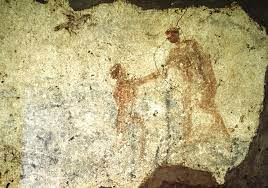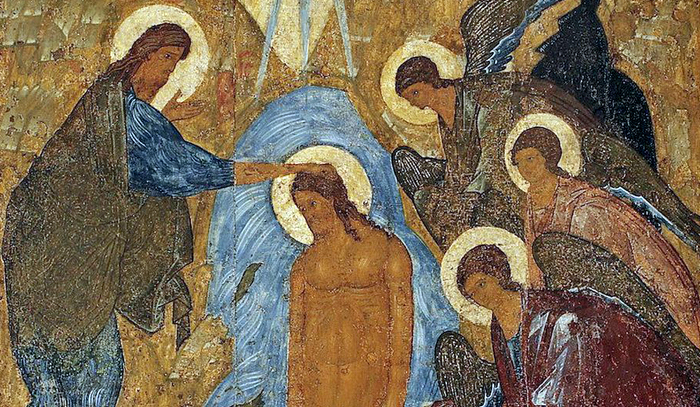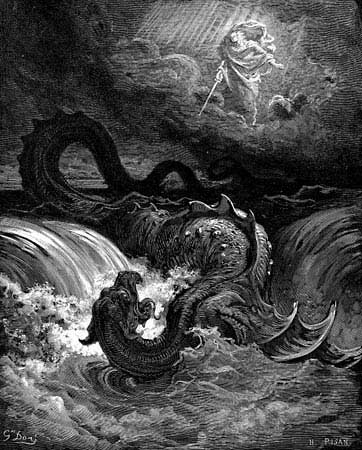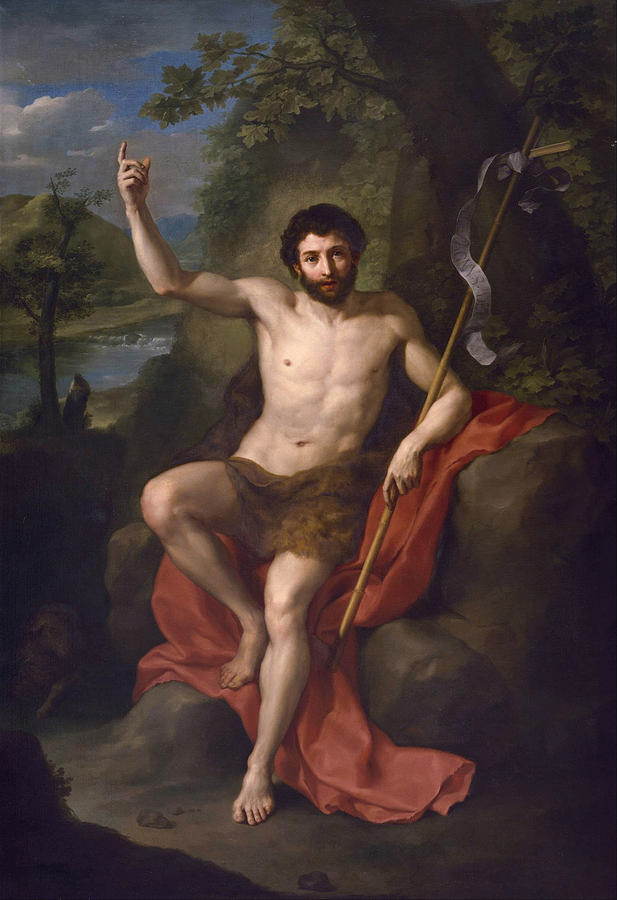
The deacon ushers you out of the stream, and you approach the priest, still wet and unclothed. He anoints you with oil saying, "I anoint you with the holy oil in the Name of Jesus Christ."

Among the earliest Church documents we possess is On the Apostolic Tradition of Hippolytus, a priest of the third or fourth century, serving either in Rome or Alexandria. It is a Church manual, which continues to be used by the Orthodox Church today. Through it, we have a very clear picture of baptism depicting the death of a previous life.
The preceding day you will have been examined by the priests probing your knowledge of the faith following months of study. They will also have investigated your personal life, its moral character, and your commitment to ministry. Who are your associates? Have you cared for the widows and orphans in your neighborhood?
Being satisfied, they will have passed you on to the bishop, who then exorcises you of any remaining impurities. He demands that you denounce your former life and spit on Satan and his cohorts. He then puts your demons to flight. Being satisfied, he will have sealed you with the oil of exorcism.
You will have sat vigil all night in fasting and prayer. It is still dark now. You stand naked beside a running stream. The more forceful the current the better. Whatever jewelry you wore is also removed. Nothing is permitted to cover you. Everything — your mind, your soul, your body — is completely laid bare. You are utterly vulnerable as at your birth. The cold air is astringent to your skin. The sky begins to be streaked with light. A priest is present. Then, a deacon ushers you silently into the rushing waters. The water is lively. It is cold rushing past you and over you. The priest demands loudly, "Do you believe in God the Father Almighty?"
"I believe," you reply with the same gravity and conviction. Immediately, the deacon pushes your head down into the dark waters. He holds you down for more than a few seconds. You realize that people die in this chaotic darkness.
You emerge. The priest asks sharply, "Do you believe in Jesus Christ, the Son of God, Who was born of the Holy Spirit and Mary the Virgin and was crucified under Pontius Pilate and was dead and buried and rose on the third day alive from the dead and ascended into the heavens and sits on the right hand of the Father and will come to judge the living and the dead?"
"I believe," you declare. Again the deacon pushes you down into the cold darkness holding you there.
You emerge. The priest again asks in an urgent tone, "Do you believe in the Holy Spirit, the Holy Church, and the resurrection of the flesh?"
"I believe," you answer urgently. Once again the deacon pushes you down into the waters, a wet grave if he hold you down too long.

The deacon ushers you out of the stream,
and
you approach
the priest,
still wet and unclothed.
He anoints you with oil saying,
"I anoint you with the holy oil in the Name of Jesus Christ."
After this, drying yourself off, a new garment is set upon you, made for you for this purpose. It is white signifying your purity and new birth. With others also being baptized that morning, you enter the church. The bishop greets you, laying his hands on you, saying, "Lord God, You have made these worthy to receive the remission of sins through the washing of regeneration. Grant that they might be filled with the Holy Spirit, sending Your grace upon them, so they may serve You in accordance with Your will. For to You be glory, to the Father and the Son with the Holy Spirit in the holy church both now and to the ages of ages. Amen."
The bishop pours the sanctified oil in his hand and places it on your head saying, "I anoint you with holy oil in God the Father Almighty and Christ Jesus and the Holy Spirit." And signing you on the forehead, he gives you the kiss of peace and says, "The Lord be with you." You reply, "And with your spirit."
You then go off to be fed with milk and honey, for that was the food YHWH promised, following baptism in the Red Sea, following a period of fasting and prayer in the Sinai wilderness, and then upon entering the Promised Land of new life.
You have been born into new life with its new beliefs and values. You are given a cleansed mind and soul tender to the will of God, for that is your new center of gravity. You have renounced old friends who have continued in worldly life. You are cleansed of all demons who once directed your thoughts and daydreams. You have been stripped of your old life, literally, which has been discarded. That old self has been ritually killed in those dark and chaotic waters. A new self has emerged. And this man (or woman) has been sealed as Christ's own, wholly acceptable before God.
The bishop used words like regeneration. A new self has been made. He pronounced remission. Today, we say our cancer is in remission, but this remission is something far deeper and greater: it is remission "now and unto the ages of ages." You are sealed in this new life again with the chrism, forever a new creature in the Imperishable One, Christ Jesus, the Lord of Life.
It is the water which was the crucible in this ordeal — the instrument both of life and death, like a great flood that washes away a former lifeworld, but then which nourishes it with life-giving properties .... both death-dealing and life-giving. Everything before was preparatory to the ordeal of death-by-water. Everything after was a human response to God's gift of new-life-by-water. It was the water: for the ancient world the embodiment of chaos, which cannot be tamed by men, which yet is the source of life.
The Scriptures tell this story:
the water that shatters fishing boats into a thousand shivers;
the water that destroys whole armies in a single stroke;
the waters devoid of form or goodness until
the Spirit of God hovered over them,
a dark, boiling cauldron of unruleable chaos,
whose personification in Scripture is the sea.
It is YHWH alone, Who might subdue the
sea-chaos
monster.
Only YHWH masters Leviathan and Rahab.
The "cohorts of Rahab lie prostrate at YHWH's feet,"
writes
Job (9:13).
And this primordial battle echoes through the Scriptures:

|
You rule the raging of the sea;
When its waves rise, You still them. You have broken Rahab in pieces, as one who is slain; (Psalm 89:9-10) The waters saw You, O God; The waters saw You, they were afraid; The depths also trembled. (Ps 77:16) You divided the sea by Your strength; You broke the heads of the sea monsters in the waters. You broke the heads of Leviathan in pieces, (Ps 74:13-14) |
YWHW has wrested order from chaos, the primordial gift of life to us:
|
The earth was without form, and void; and darkness was on the face of the deep.
And the Spirit of God was hovering over the face of the waters. Then God said, "Let there be light"; and there was light. (Gen 1:2-3) |
Where a darkness had boiled in meaningless churnings, an orderly universe now has appeared, goodness, intelligence, order.
When the Alexandrian Jew, Apollos, meets Ss Prisca, Aquila, and Paul, he, as yet, has only received the Baptism of John. On the other hand, he does realize that the passage of the people Israel through the Red Sea signified precisely YHWH's mastery over the elements: even over the chaos of death, conferring new life upon God's people, represented by a Land of Promise. St. Paul would incorporate this into his own preaching at Corinth, writing that the Jews "were all baptized into Moses through the cloud and the sea" (1 Cor 10:1-2).
This life, which blessed me beyond words, also conferred a hidden gift. I was granted the privilege of time travel. For our town seemed to have been preserved as in amber from a much older age. Their Corpus Christi processions astonished me, for the only place I had seen such things had been through the paintings of Pieter Brueghel the Younger and others.
The people lived much closer to the world of the soul and God and the archetypes of the psyche. Theirs was an immediate interface with the Divine. They wept when Jesus appeared at the Eucharist. They turned their most ardent hearts to the priests who sat in fours and fives as hundreds of people queued up to confess their sins. And when the season came for the blessing of water, more jugs and jars and pails appeared than one might have imagined existed in our town. Every church was inundated. Certainly, the priest realized that thousands of gallons would have be prepared.
The instinct for these sanctifying waters was palpable. The people knew of the water's holy properties, putting demons to flight. This was no mere catechism. This was not an affair of the brain or of the Church's teachings. The people knew these things right down to the bottoms of their feet and into the deepest recesses of their souls. Try to separate one of these people from the blessed water, and you would discover how deep these feelings ran.
Seeing this, I understood the New Testament as I never had before: the sanctifying waters, the yearning for the Divine, the desire for new life. The Jews thirsted for this water, ardently, intently, laying their lives down before it. This was no mikvah bath as one step in a process of ritual cleanness. It that were true, we would have seen this frenzy long before the appearance of the Forerunner.
Let us read the Gospel accounts carefully.
The Baptism of John is the starting point for St. Mark's Gospel:

|
"Behold, I send my messenger before thy face,
who shall prepare thy way; the voice of one crying in the wilderness: Prepare the way of the Lord, make his paths straight — " John the baptizer appeared in the wilderness, preaching a baptism of repentance for the forgiveness of sins. And there went out to him all the country of Judea, and all the people of Jerusalem; and they were baptized by him in the river Jordan, confessing their sins. (Mk 1:2-5) |
This was no mere immersion in a river, but a tsunami washing over the entire Levant: "there went out to him all the country of Judea, and all the people of Jerusalem." We must picture whole villages emptying, the streets of Jerusalem deserted. The stature of St. John the Baptist was sufficient to give pause to a king (while he was sober).
The Prologue of St. John's Gospel is preoccupied with these scenes — of the first thirty-four verses more than half dwell on St. John the Baptist. And the Evangelist John must repeatedly insist that the Forerunner was not the light to all nations, Yet, to the people the Baptist was manifestly the man of Eden possessing, therefore, the power to bring everyone back to Eden with him.
St. Luke's Gospel may be said to be about the tale of the Forerunner and Eden. Consider its "bookends," its opening and closing verses. The entire beginning invokes Isaiah, depicting the advent of St. John the Baptist. And it ends with the Son of God hanging on a Cross promising, "this day you will be with Me in Paradise," that is, Eden.
St. Peter characterized baptism as an antitype to the flood of Noah (1 Peter 3:20-21). And which diluvian baptism had been more vivid in Peter's time than the overwhelming Baptism of John, a general flood inundating the entire eastern Mediterranean shore (a man as distant from Jerusalem as Apollos of Alexandria had received this Baptism) cleansing not only "the filth of the flesh .... but the answer of a good conscience toward God" (Ibid).
What can we say about these events? They were world- and life-changing, prepossessing the hearts of all the people, the Evangelist writes.
We might search in vain for a proximate reason for this culture-renovating movement. Perhaps we can say that it spoke to something deep within each soul .... which was the voice of God spoken through His servant, the herald of His Son.
Does Jesus Himself have need of the Baptism of John .... or of anyone? Does the Lord of Life have need of new life? Does the One Who commands waves and tempests to be stilled have need of assistance?
The waters are dark and deep, a churning chaos as at the primordial beginning, before the Spirit of God hovered over them. The Son of God goes down into the waters, transmuting them forever by virtue of His Divinity. He then emerges as the Heavens are opened, and He sees a Reflection of Himself: God the Father, the Holy Spirit, and the Logos of Creation, hovering once more over the waters, creating the world anew.
And He tells St. Photini,
at a place not far from the Hebrew Temple at Mt. Gerizim,
".... the water I shall give
will become within a fountain of water springing up unto everlasting life"
(Jn 4:14).
In the Name of the Father and the Son and the Holy Spirit.
Amen.